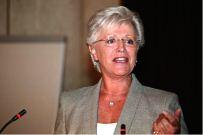 HRH Princess Muna Al-Hussein of Jordan, WHO Patron for Nursing and Midwifery in the Eastern Mediterranean Region20 May 2014 – The Sixth Global Forum for Government Chief Nursing and Midwifery Officers successfully concluded in Geneva on 15 May, in the presence of Her Royal Highness (HRH) Princess Muna Al-Hussein of Jordan, WHO Patron for Nursing and Midwifery in the Eastern Mediterranean Region, senior government nursing and midwifery staff and representatives from key nursing and midwifery organizations.
HRH Princess Muna Al-Hussein of Jordan, WHO Patron for Nursing and Midwifery in the Eastern Mediterranean Region20 May 2014 – The Sixth Global Forum for Government Chief Nursing and Midwifery Officers successfully concluded in Geneva on 15 May, in the presence of Her Royal Highness (HRH) Princess Muna Al-Hussein of Jordan, WHO Patron for Nursing and Midwifery in the Eastern Mediterranean Region, senior government nursing and midwifery staff and representatives from key nursing and midwifery organizations.
This year’s Forum deliberated on how best the nursing and midwifery workforce can contribute towards efforts for universal health coverage under three distinct themes – leadership and management, education and collaboration.
HRH Princess Muna Al-Hussein, a champion of nursing and midwifery, opened the high level meeting and participated with keen interest in all sessions of the Forum. Noting that health workforce regulation remains a challenge in most developing countries, she called for the institutionalization of nursing and midwifery regulation to ensure the delivery of competent care to communities. She further emphasized the need for:
“government chief nursing and midwifery officers, educational institutions, WHO collaborating centres for nursing and midwifery, and professional associations to work together and adopt a strategic approach to developing the leadership capabilities of nurses and midwives to support universal health coverage.”
Dr Ala Alwan, WHO Regional Director for the Eastern Mediterranean, reminded participants of the key strategies to be adopted and the importance of networking and collaboration in strengthening nursing and midwifery. The strategies include: strengthening nurses’ and midwives’ involvement in policy-making; institutionalizing a regulatory system for both nursing and midwifery education and practice; developing national strategic plans for nursing and midwifery; improving pre-service nursing/midwifery education; establishing systems for continuous professional development; building up management and leadership capabilities of nurse/midwife leaders to strengthen the delivery of services; and developing evidence-based education and practice.
The Forum also provided an opportunity to reflect on achievements since the last forum in 2012, which had focused on noncommunicable diseases. The Forum concluded with a statement which commits government chief nursing and midwifery officers, under the three themes, to:
1. Leadership and management
Build political support at the highest levels to ensure continuity in the pursuit of universal health coverage.
Formulate nursing and midwifery policies that encapsulate the vision of universal health coverage to ensure integrated people-centred services.
Develop and or strengthen policies for improving the quality of education and training, recruitment, retention and deployment.
Develop evidence-based policies for effective and efficient nursing and midwifery workforce leadership and management.
2. Education and training
Support educational institutions to develop and implement curricula that take into account the quantity, quality and relevance of the nursing and midwifery workforce to meet the local and national health changing needs.
Build and sustain the technical capacity to ensure quality education and practice through continuing professional development programmes.
Work and support partners’ effort to assess the gap between the need for a health workforce, actual supply, geographical distribution (stock, skills mix and competencies) and the population’s demand for health services.
3. Collaborative partnerships
Identify key partners including service users to support and build the capacity of the nursing and midwifery workforce to contribute to universal health coverage.
Develop and support [nursing and midwifery] interventions that lead to improved access to health care services.
Develop strategies that support the creation of links between the public, nongovernmental and private sectors to minimize barriers of access to health services in rural and remote or hard-to-reach areas.


